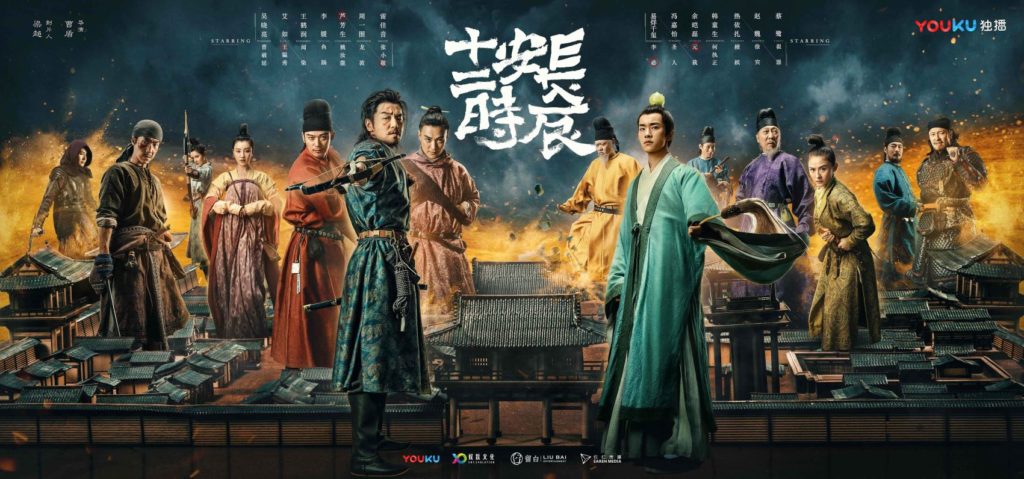Ep 38
–
Today’s episode is very flashback heavy. We are still in the 1am ish hour but we spend most of this episode seeing how brutal it was for Zhang Xiao Jing and his men on the front lines almost a decade ago. In episode 37, Zhang XIao Jing and Yu Chang were duking it out in the giant lantern tower. Wen Ran arrives and sprays some type of fragrance powder over them that basically knocks them out. Zhang XIao Jing is fighting for consciousness on the floor and that results in us seeing this flashback.
On 烽燧堡, the soldiers of the 第八团 or 8th Squad are doing their best to fend off the attackers. Except it’s not easy. Men are brutally killed and the survivors are understandably unnerved. One man, 丁老三, cries out that they are all invincible! None of the 200 brothers of the 8th squad will die. It’s his way of giving himself some more courage in the face of low survival odds.
The situation is quite dire. There are dead bodies everywhere with limited food. A fight almost breaks out as the men try to grab what little food is left before a soldier creates some order. At this point, Zhang Xiao Jing asks Wen Wu Ji to continue telling stories about Chang An. This story helps give these famished and tired men the imagination to dream of something better.
In the midst of this story, Zhang xiao Jing runs up to another soldier and gives him a bag of mint. The camera pans to this other soldier’s face. He’s dirtied and disheveled, but we clearly see that it’s 龙波。
Apparently, Long Bo was a fellow soldier alongside Zhang Xiao Jing. From the conversation, this man is tasked with protecting the squad’s flag as an archer of the group. His weapon is the crossbow. He hasn’t slept in days in order to protect it. That is his one fixation, that might be keeping him alive. The two men discuss the stories that Wen Wu Ji tells about Chang An. Long Bo doesn’t believe that the stories are true but Zhang Xiao Jing is willing to believe that they are actual facts. Chang An has over a million people in the 108 “fangs”. Zhang Xiao Jing wonders how amazing the city would be like when just the 200 men of this squad all have exceptional skills. Imagine what a city of 1million could be. He says that people always need to have a dream in order to survive. His dream is to go to Chang An. Surviving is the only way to get there. Ideals or beliefs will be what gives people strength to not give up.
The men of the 8th squad are attacked in the night with many of their men killed. By morning, they are counting the dead. Ding Lao San urges Zhang Xiao Jing that they should retreat. If there was any backup, they should have arrived by now. These men have been defending this beacon for 20 days. Ding Lao San argues that it wouldn’t look poorly on them if they fell back in order to survive. However, it’s that term again. 不退 that we’ve heard throughout the drama. Wen Wu Ji is adamant that they do not retreat. The remaining men also cry out that they will not retreat, while 丁老三 eats all of the food they have left.
If you recall, this Ding Lao san we saw for a brief moment as a member of the 守捉郎 or mercenary group. He stated then that he cannot be more than a few feet away from food. Part of that was seeing hsi family die of hunger. Another I’m assuming is leftover trauma from not having enough to eat while on the battlefield.
Long Bo is hugely pissed off at 丁老三 and orders him to be bait against the attacking turkic soldiers. 丁老三 doesn’t make much fuss and goes solo down to the turkic camp to bait the men towards the Tang soldiers. They are able to defeat a number of them to live another day.
Except, there’s no food left. These men who have been defending the beacon are left with little energy following a depletion of food. Ding Lao San wants to lead a charge of men home in order to survive but is met with resistance. They don’t want to be labeled as soldiers who abandoned their post. Just as a fight was about to break out, a soldier 陈行范 returns with a few bags of grain. He went scouting for food and finally returned. The men, overjoyed, cook up some of the grain to survive another day. This 陈行范 reassures them that reinforcements are on their way. The group lets out a sigh of relief. THeir efforts are not in vain and they will hopefully survive to go home.
Sadly, that is not the case. One of the soldiers falls into a trap set by the turkic soldiers and is brutally humiliated then murdered. The idea was to bait the remaining Tang soldiers to rescue the soldier. Under pressure, this 陈行范 can only tearfully explain to the group that there are no reinforcements. He walked for days to many different posts and met no Tang soldiers. They all retreated and left. The 8th squad is on their own with absolutely no reinforcements. The food he brought back was what he scrounged up as leftovers. The Tang army has forsaken them. To make matters worse, there will be about 3000 turkic reinforcements that arrive over the next two days. 3000 men against the famished and tired members of the 8th squad. That’s it.
The reality set in for these men. Wen Wu Ji explains to the group that in Chang An, the lantern festival is the busiest night of the year. People will write names of fallen soldiers on lanterns in order to remember them. But who will remember that this battle occurred? But that’s what he wants. To fight the battle on the border so that his family does not have to fight the battle at home. After hearing these words, and in a surprising twist, Ding Lao San orders for 陈行范 to take a young injured solder home. Escape from here. He, 丁老三 will remain here. The person who wanted to leave the entire episode, now has decided that he is a soldier. He will protect others. He will not have others protect him.
The episode ends with us seeing zhang xiao jing in chang an talking to wen ran. Evidently, he made it to Chang An, protecting the family members he strived to do.
–
This was a background heavy episode with not much history but we do have 2 topics to cover. The first is a gentleman called 宇文恺. 张小敬 mentions his name as the man who built 长安 so who was this guy?
宇文恺(555年-612年)and was a member of the pretty famous 宇文 clan of 鲜卑 origin. 鲜卑 was an ancient nomadic group in which members settled in parts of modern day china. 宇文恺 came from a military family but he chose instead the arts and more importantly architecture.
In 581, 杨坚 seized the throne and established the Sui Dynasty. He purged the old royal family of 宇文 who ruled Northern Zhou but 宇文恺’s family wasn’t from the same branch and thus spared from this purge.
The capital of the Sui Dynasty was established at 长安, but at that time, it was already an 800 year old city that was too small for its current population and was frankly, falling apart. The Emperor thus decided to build a new capital city to the southeast of the old Chang An on the 龙首山. The Emperor tasked members of his court to build this grand new city.
宇文恺 served as the main architect of the city, providing the basis for the construction to begin. This new city was not called 长安 but instead, 大兴城 because the Emperor was known as the 大兴郡公 or the Da Xing Duke of the Second Rank. The name didn’t change to Chang An until the Tang Dynasty.
The city was first completed in 583 but there was a lack of water. The Emperor ordered a canal to be built from the river 渭水 all the way to the Yellow River. 宇文恺 led the efforts to build the canal, a distance almost 300 kilometers, and was then known as 广通渠qú.
In 586, 宇文恺’s brother mounted an insurrection but was captured and killed. 宇文恺 was also banished for a number of years due to his brother’s actions. In 602, he regained favor with the Emperor after building 仁寿宫 and the mausoleum for Empress Du Gu.
In 604 – the now Emperor Yang Guang wanted to build an eastern capital to maintain control over regions closer to the east such as He Bei and Shan Dong. He set his sights on the city of Luo Yang and had 宇文恺 build the plans to build a splendid new city near the old city of Luo Yang.
宇文恺 died at the age of 57 in 612. 宇文恺 was known for his contributions of architecting the 2 major cities of the Sui and Tang eras – 大兴城 or 长安 and 东京 or 洛阳. His designs for the city and the canals were the basis that allowed for the cities to grow into the splendid cities that lasted for another 400 years.
Lastly – let’s talk about crossbows. We’ve always seen 张小敬 with his crossbow, but we see in this episode that he was a valued member with his troops because of his skill with the crossbow. Let’s talk a little bit about crossbow archers in the context of Chinese history and the Tang Dynasty.
China was the first civilization to invent crossbows. Some put the date around the 7th century BC. The weapon had always been used across millennia but by the time we get to the Tang Dynasty, bows were favored more than crossbows. Due to the empire’s influence from nomadic tribes, the Tang military placed heavy emphasis on bows. Crossbows took time to reload, which meant that you could only have 2 good shots before a cavalry unit was able to charge through. According to one historical text, one army had 12.5K bows but only 2.5K crossbows.
Bows were much more ubiquitous and the Tang government had strict rules on who could use crossbows. They definitely weren’t allowed for personal use but bows were. Throughout the drama, we also see bows used by many more soldiers than crossbows.
We’ve talked about other weapons such as the Mo Dao – those all took precedence over the crossbow.
During the Kai Yuan era – the Imperial Army had 7 types of crossbows
唐开元时期禁军用弩有七种:“一曰擘bò张弩,二曰角弓弩,三曰木单弩,四曰大木单弩,五曰竹竿弩,六曰大竹竿弩,七曰伏远弩。”
Out of the 7, only 2 were for individual use. 擘bò张弩 were used by the infantry and 角弓弩 by the cavalry. Throughout the drama, 张小敬 has his own personal crossbow that definitely wasn’t military authorized. I was also reading some analysis that there’s basically no way his crossbow was able to have that much “firepower” to kill people at the ranges he did. But hey – this is all for dramatic purposes and I think the drama did an excellent job mixing the crossbow in with all the other weapons.
To Close out – during the Song Dynasty, the Song Empire was severely lacking in its calvary – hence why it had to further innovate on its crossbows against the nomadic tribes in the north. During that time, crossbow archers comprised of half or more of the Song armies.

